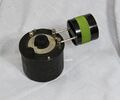358: Difference between revisions
Jump to navigation
Jump to search
No edit summary |
No edit summary |
||
| Line 24: | Line 24: | ||
* [[Media:GRwiki Catalog K1 OCR 1939.pdf|K1 (1939)]], p.164 | * [[Media:GRwiki Catalog K1 OCR 1939.pdf|K1 (1939)]], p.164 | ||
}} | }} | ||
The '''General Radio 358 Amateur Band Wavemeter''' was introduced in 1924 Bulletin 926 and available through Catalog K1 1939. | The '''General Radio 358 Amateur Band Wavemeter''' was introduced in 1924 Bulletin 926 and available through Catalog K1 1939. | ||
The Type 358 is an absorption type wavemeter covering the four overlapping bands. It has an frequency accuracy of 1% and uses an incandescent lamp as a resonance indicator. The lamp is in a special socket that closes the connection when the lamp is removed if not needed. A Type [[247]] gear driven condenser is used inside the meter. Each wavemeter is supplied with a calibration chart produced with settings accurate for that particular meter. | |||
==Specifications== | ==Specifications== | ||
Revision as of 08:04, 1 April 2024
The General Radio 358 Amateur Band Wavemeter was introduced in 1924 Bulletin 926 and available through Catalog K1 1939.
The Type 358 is an absorption type wavemeter covering the four overlapping bands. It has an frequency accuracy of 1% and uses an incandescent lamp as a resonance indicator. The lamp is in a special socket that closes the connection when the lamp is removed if not needed. A Type 247 gear driven condenser is used inside the meter. Each wavemeter is supplied with a calibration chart produced with settings accurate for that particular meter.
Specifications
- Frequency Ranges
- Wavelength: 14 to 28 Meters, 26 to 56 Meters, 54 to 114 Meters, 105 to 220 Meters
- Frequency: 10.0 to 20.0 MHz, 5.0 to 10.0 Mhz, 2.5 to 5.0 MHz, 1.5 to 3.0 MHz
- Accuracy: 1%
Links
- Experimenter describing Type 358 February 1926
- Experimenter describing the calibration of Type 358 July 1927










